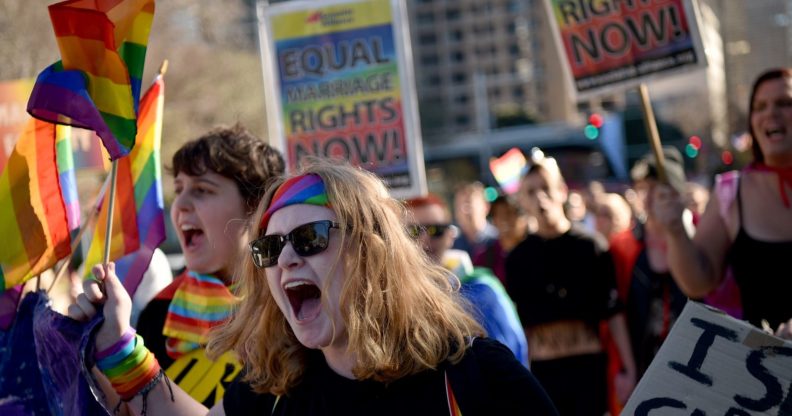Marriage equality could prevent 3000 teen suicides a year, say leading mental health groups

(Photo: PETER PARKS/AFP/Getty Images)
Leading mental health organisations in Australia have banded together to support the ‘yes’ campaign in Australia’s ongoing equal marriage postal survey.
This comes after weeks of crisis talks, as the groups report a surge in demand for mental health services, from LGBT people, particularly young people, struggling to cope during the nationwide debate.
They believe that the legalisation of same-sex marriage could stop as many as 3000 teenagers per year from committing suicide.
The information campaign, called #mindthefacts, aims to show the hard facts about the devastating impact of LGBT discrimination.

Counter protesters (Photo by PETER PARKS/AFP/Getty Images)
It is being led by highly respected mental health groups ReachOut, Orygen, Headspace, Sydney University’s Brain and Mind Centre, and the Black Dog Institute.
“As Australia’s leading youth mental health organisations, we see, hear and feel the real and devastating link between LGBTIQ discrimination and youth suicide rates and mental illness every day,” campaign spokesman and ReachOut CEO, Jono Nicholas, said.
The groups came to the statistic of 3000 teenage lives per year, by corroborating research from mental health organisations and government surveys.
They found that one in 40 high school-age children had attempted suicide in the past year, and that introduction of same-sex marriage on a state level had correlated with a 7% decrease in suicide attempts.
Digital youth service ReachOut said that since August when the postal survey became policy, they have seen a 20% rise in people accessing their LGBT advice pages.
Surges in their online forums have shown young people expressing hurt and anger at the homophobia they are seeing expressed on a daily basis both in person and online.
“We are hearing a lot from LGBTIQ people that this is reviving traumatic experiences, particularly from their school years,” Professor McGorry, the executive director of Orygen, said.
“Australia is on the threshold of something really positive but we do have to manage the risk to vulnerable people over the course of the debate.”
However, campaigners on the other side have rejected the concerns raised about the way this campaign could damage mental health, with senator Matthew Canavan saying that people should “grow a spine and grow up.”
Others have compared the discrimination felt by LGBT people to the backlash they have felt for opposing equal marriage.
“A culture has developed whereby it’s acceptable to vilify, mock, abuse and shame anyone who stands in the way or even raise questions about whether we should legalise same-sex marriage,” Federal Liberal Party vice-president Karina Okotel told the National Press Club.
“I have been called a homophobe, a bigot and been told that my views are disgusting.”
However the #mindthefacts campaign will not stop until people are aware of just how seriously this debate is damaging LGBT young people.
Jono Nicholas said he fears the country will be “counting the cost” of this survey for years – not in budget, but in the livelihood of its citizens.

